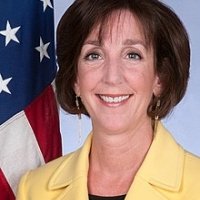Watching the scandal about Ukraine unfold, I have thought often about my former colleague as a United States ambassador, Marie Yovanovitch. An experienced, thoughtful, and effective senior officer, she had made remarks about corruption that put her in the cross hairs of the Ukrainian government to which she was accredited, and was quickly removed from her post.
In my own public remarks as an ambassador, to Mexican senators in 2016, I focused on corruption in the country, building on widespread public sentiment in elections that year. I did not think this was out of bounds, either for my government, since anti-corruption had been a core American value for years, or for Mexico. I was simply saying what so many Mexicans had told their compatriots and the press. Yet it caused a stir - not only because I spoke in the wake of delays that had slowed the legislature's passage of a sweeping anticorruption package, but because the next day, the Mexican press was filled with side-by-side reports on real estate "gifts" to Mexico's first lady - a junxtaposition I could not have anticipated.
After that speech, I faced a brief but distinct frostiness from the presidential palace. But my case ended differently, I never doubted the support of my own government for what I had said, and for being a champion of Mexicans who had an anticorruption agenda.
In the Ukraine case, by contrast, Ambassador Yovanovitch not only lost her post, she endured a smear campaign by the executive branch of her government at the highest possible level. What we are learning every day about Ukraine - on pay with what we hear President Trump say on the White House lawn about China policy - is a radical break from bipartisan support for how we deal with other nations. Alongside presidential abuses of power, we are witnessing the quiet death of a policy against corruption and for rule of law that for nearly three decades was among America's most important objectives abroad.
For those of us who have spent our careers in the Americas, the priority we give the administration of justice (or rule of law, or anticorruption efforts - whatever it is called at the moment) has been an article of faith since the 1990s. As Latin American countries changed from authoritarian and military rule to democracy, their new leaders and our government understood that creating fair, transparent judicial systems would be essential for sustaining true democracy. State Department and USAID officers who began their careers in Latin America would serve later in Eastern Europe or the Middle East because they had created some of the best practices in supporting democratic change. Sometimes the programs worked, sometimes they didn't. What didn't waiver was American support for the elements of good governance.
Right up until 2017, when the Obama administration ended, our government's support for the rule of law and against corruption was a bipartisan goal. Indeed, when the George W. Bush administration created the Millennium Challenge Corporation in 2004 to engage in a new kind of foreign assistance, the first six of 17 listed criteria were: civil liberties; political rights; voice and accountability; government effectiveness; rule of law; and control of corruption. In that and other United States benefit programs then, officials in the executive and legislative branches believed that some success in reducing corruption in a country was required to justify sending it funds collected from American taxpayers.
But the policy went beyond logical fiduciary obligations. The United States, under Republican and Democratic administrations, stood for fairness, rule of law, and a level playing field around the world. To be sure, we didn't always succeed. But the point we were making was that we were always striving to meet high standards. And even when we failed, the examples of officials going to jail reminded us of our obligations to our national ideal.
During my 31 years at the State Department, we brought members of the Justice Department's office of public corruption to most countries to talk about best practices and outline some of the most serious cases in the United States, to underscore the point that while you could never completely eliminate corruption by public officials, the effort to bring them to justice was honorable, necessary, and often successful.
In destroying that consensus on the importance of the rule of law and the fight against corruption, the Trump administration has also delivered a significant blow to any ability of the United States government to hold the moral high ground on these issues. And that is a blow to our own national security, which is enhanced when we work closely with allies who share our values. Indeed, we prosper when our companies, bound by the Foreign Corrupt Practices Ace, compete without graft for contracts and major commercial projects.
In other words, we lead by example. And what is the example of President Trump and his chosen advisers?
In ceding the moral high ground and becoming not only crassly transactional, but corrupt in our dealings with other countries, we have lost something that should be precious to us and that must regain our values: being a country of laws, believing that access to a fair, accessible, accountable legal system is a universal right, and keeping our commitment that those around the world who fight for those rights will have our support. The current loss of those principles makes us "like everybody else" in a world where "everybody does it" - a loss that makes us less safe, less prosperous, and less of an example.
And that worries not just us, but also millions beyond our borders.
This article was originally published in The New York times...
The views expressed here are solely those of the author.
Author


Mexico Institute
The Mexico Institute seeks to improve understanding, communication, and cooperation between Mexico and the United States by promoting original research, encouraging public discussion, and proposing policy options for enhancing the bilateral relationship. A binational Advisory Board, chaired by Luis Téllez and Earl Anthony Wayne, oversees the work of the Mexico Institute. Read more

Explore More
Browse Insights & Analysis
Promoting Convergence in US-Brazil Relations

360° View of How Southeast Asia Can Attract More FDI in Chips and AI

Israel Escalates Attacks in Gaza: What’s Next?

